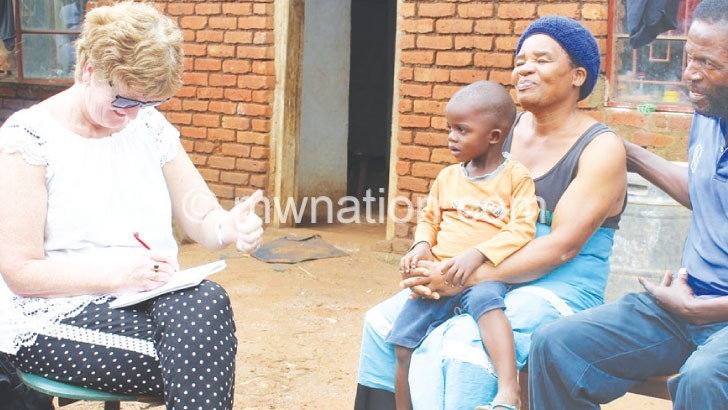Saying goodbye to gender-based violence
Winfred Khwangwala, 66, from Helemani Village, Traditional Authority Khwethemule in Thyolo has five children and four grandchildren.
The man is a community-based facilitator and gender champion for Malamulo Farmer Field School (FFS) which comprises of 21 farmers—eight men and 13 women.
He became a full-time farmer in 2017 following retirement from his profession as a printer at Malamulo Publishing House in Makwasa, Thyolo where he had worked for 41 years.
In 2018, when farmers were setting up Malamulo FFS in his village, Khwangwala was elected the leader because of his curiosity about agriculture. The group is currently growing maize, groundnuts and sweet potatoes.

having a conversation with Khwangwala and his wife
The FFS is built upon principles of adult education and experiential participatory learning processes. Its approach provides a forum for farmers to meet and discuss issues and experiment together on possible solutions that they can implement. It also enables the farmer to learn and share knowledge and skills on various technologies based on farmer-led research.
Khwangwala’s home district is listed among 10 districts with a gender-based violence (GBV) prevalence of 35.2 percent which is higher compared to the national prevalence rate of 34 percent, according a recent gender analysis conducted by Self Help Africa.
The analysis was conducted with funding from European Union (EU) under the Kutukula Ulimi m’Malawi (Kulima) Better Extension Training Transforming Economic Returns (Better) Project.
Besides Thyolo, the other nine districts are Karonga, Chitipa, Mzimba, Nkhatabay, Kasungu, Salima, Nkhotakota, Mulanje and Chiradzulu.
To address the GBV high prevalence rate in the 10 districts, the Kulima Better Project adopted the Gender Action Learning System approach (Gals) to promote gender equality, challenge gender norms that lead to gender-based violence and engage men as champions of change in championing gender equality.
“The Gals is a community-led empowerment methodology that will address GBV among farming households, and its adoption in the Kulima Better Project, will significantly reduce incidences of gender-based violence in the 10 districts,” says Self Help Africa gender advisor Regina Matengo.
She adds that during the Gals training, tools and diagrams are used to record participants’ personal lives and households identify individual visions which are merged into a soulmate vision for the family.
“Participants then do a mapping of milestones towards achieving their vision. In addition, the approach helps in redistribution of gender roles and resources at household and community level,” she adds.
Khwangwala is happy he underwent the Gals training as it has changed his attitude.
“Before the training, I was the lion of the house and very inconsiderate to my wife and children. I used to be the only decision maker in the house and emotionally abuse my wife by cheating on her and denying her resources.
“Even though my wife was contributing towards income through the village and savings loans, she did not have a say with regards to how the money will be spent in the house,” he says.
However, the case is different now. Barely seven months after Gals training, Khwangwala and his family have noted changes in their perception of gender issues.
“The training has changed my thinking; I can respect my wife now. Our life has improved in terms of productivity because we bring our resources together, plan together and contribute to savings as a household.
“How I wish I had learnt about Gals when I was in my thirties, that time I was strong and full of life and we could have achieved more,” he says.
Besides developing the capacity to make changes in his own life, Khwangwala has become a champion of change in his own family.
Using the Gals tools, his family has mapped their vision by the year 2021. They would like to build a good house with electricity and they are working out the steps they need to take for their goal to be achieved.
Khwangwala and his wife have also grown maize on 4.5 acres of land and they have established an integrated homestead farming comprising of small stock (chickens), a backyard garden where they grow leafy vegetables, onion and pepper, and an orchard with more than 14 species of fruits which include both exotic and indigenous fruits.
He has also become a change agent in his community through educating other families about gender issues, both from FFS and non- FFS members, including having sessions with teachers from the mission center in the district.
Currently, he has trained at least six families, three of which are not FFS members, in Gals methodology.
“I have helped the families in understanding the implications of gender inequalities so that women and men in my village benefit equally from the agricultural interventions being brought in the community at household level,” says Khwangwala. n





